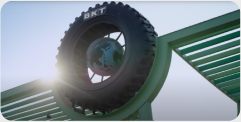Selecting the right tires for construction machinery is paramount for achieving peak performance and efficiency. In recent years, radial tires have gained popularity, and this article aims to explain their characteristics, advantages over standard tires, construction benefits and limitations.
Understanding Radial Tires
A radial tire features a unique structural design where the cord plies run perpendicular to the direction of movement, allowing for enhanced flexibility and a larger footprint on the road or terrain. Belts in radial tires run radially from bead to bead, giving the tire its name.
Distinguishing Radial from Standard Tires
The key difference lies in their construction. Radial tires have plies laid down radially, while standard tires have diagonal ply arrangement. This fundamental distinction results in varied performance characteristics.
Advantages of Radial Tires
Improved Traction: Wider contact surface enhances traction, providing stability and control, especially on uneven surfaces found in construction sites.
Fuel Efficiency: Lower rolling resistance leads to improved fuel efficiency, translating to long-term cost savings.
Comfortable Ride: Effective absorption of shocks and vibrations results in a more comfortable driving experience.
Drawbacks of Radial Tires
Cost Consideration: Radial tires tend to be more expensive than standard tires.
Sidewall Vulnerability: Increased susceptibility to sidewall damage makes them less suitable for extreme off-road conditions.
Construction-Specific Advantages of Radial Tires
Radial tires offer distinct benefits tailored to the demands of the construction industry, enhancing the performance of heavy equipment like excavators and loaders.
Improved Maneuverability: Radial tires enable smoother and more precise maneuvering, thanks to their unique design that enhances flexibility. This agility is crucial for navigating tight construction sites and intricate workspaces, providing operators with improved control and efficiency.
Stability on Uneven Terrain: Radial tires excel in providing stability on uneven ground, reducing the risk of slips and skids. The wider contact surface and radial belt arrangement enhance traction, creating a safer working environment and minimizing the potential for accidents or equipment damage.
Fuel Efficiency and Cost Savings: The inherent fuel efficiency of radial tires results in significant cost savings for construction businesses. Reduced rolling resistance translates to lower fuel consumption, allowing companies to manage resources more strategically and competitively.
Extended Tire Lifespan: Radial tires withstand the harsh conditions of construction environments, exhibiting greater resistance to wear and tear. The even distribution of load across the tire reduces stress points, resulting in a longer lifespan and minimizing the need for frequent replacements and associated maintenance costs.
Operator Comfort and Productivity: Radial tires contribute to operator comfort by effectively absorbing shocks and vibrations. This not only prevents operator fatigue but also enhances focus and precision during construction tasks. A comfortable operator translates to increased productivity and efficient project timelines.
Compatibility Considerations
While ideal for construction equipment, radial tires may not be universally suitable for all vehicles. Compatibility depends on parameters like load capacity, speed rating, and specific vehicle needs. Manufacturers' specifications and professional guidance should be consulted to ensure optimal tire selection.
BKT Recommendations:
-
This tire is the best for all operations regarding high traction.
-
The multi-layer steel belt is great for excellent traction stability and durability.
-
For a tire with high puncture resistance and long wear, even on long hauls designed for rigid haul trucks, the Earthmax SR 47 is best for you.
- This tire is specially designed for loaders, dozers, and low-profile dump trucks operating in rocky conditions, specifically for underground operations.
Check out our other advanced tire collections here.






.jpg)